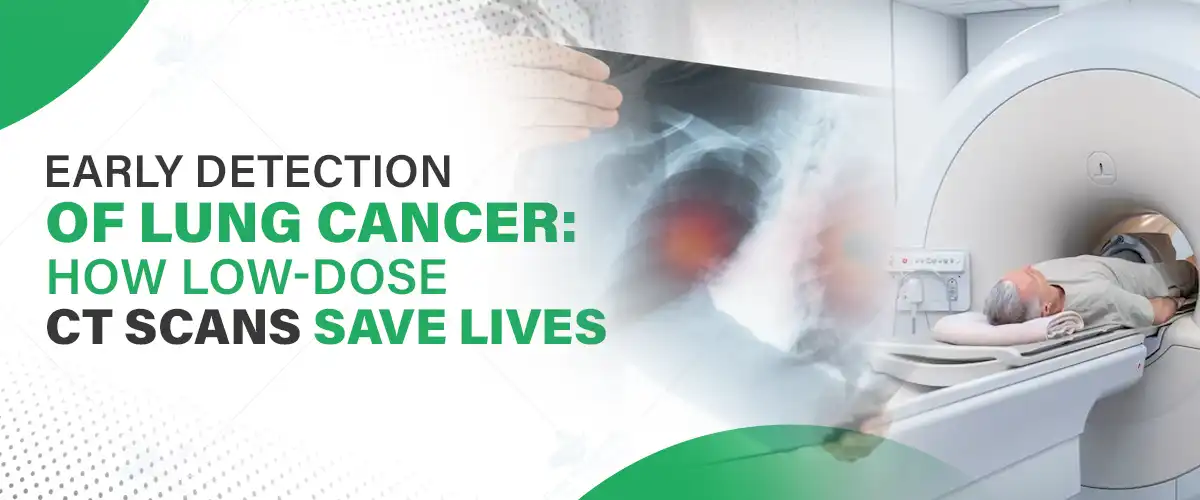
Subscribe to our

Lung cancer continues to rank as one of the most devastating cancer types globally, claiming millions of lives every year. The key to reducing this heavy toll lies in early detection, which significantly improves survival rates. Modern lung cancer screening tests, such as Low-Dose CT (LDCT) scans, are transforming how we approach this silent killer. At cutting-edge institutions recognized as a top cancer hospital in Noida, the path to early detection and effective treatment has never been clearer.
Contact us at +91 9667064100 today to learn more about lung cancer screening tests and how they can save lives.
Lung cancer is a type of cancer that begins in the lungs, often resulting from the uncontrolled growth of abnormal cells in one or both lungs. These abnormal cells can cluster together, forming a tumor, which may spread to other parts of the body if not detected and treated early.
The disease is one of the leading causes of cancer-related deaths globally, affecting millions of individuals each year. Its prevalence underscores the importance of awareness, early detection, and appropriate treatment strategies.
Lung cancer is categorized into two primary types:
Common Risk Factors:
Symptoms (Often Appear Late):
In its early stages, lung cancer is typically asymptomatic, emphasizing the importance of routine screening tests to catch the disease early.
A Low-Dose CT scan is a breakthrough diagnostic tool designed to detect lung cancer at its earliest and most treatable stages.
How LDCT Works:
Key Advantages:
Why Early Detection Matters:
By uncovering cancer before symptoms appear, LDCT empowers patients to take proactive steps toward recovery.
Eligibility Criteria for LDCT Screening:
1. Age: Adults aged 50–80 years.
2. Smoking History: Heavy smokers with at least a 20-pack-year history (1 pack/day for 20 years or 2 packs/day for 10 years) or those who have quit within the past 15 years.
3. Additional Risks: Individuals with significant exposure to carcinogens or a strong family history of lung cancer.
Consulting a healthcare provider is essential to determine if LDCT is right for you.
LDCT scans offer unparalleled benefits in the fight against lung cancer:
Patients often have questions about LDCT scans:
Preparation for an LDCT scan is straightforward:
The procedure itself is painless, quick, and stress-free, lasting only a few minutes.
Felix Hospitals stands out for its advanced facilities and highly skilled team of oncologists.
Leading Specialists for Lung Cancer Care:
With their experience and patient-focused approach, Felix Hospitals ensures comprehensive care, from early detection to personalized treatment plans.
If you or a loved one is at risk for lung cancer, just schedule an appointment with the best oncologist at Felix Hospitals by Clicking Here.
Early detection of lung cancer through Low-Dose CT scans has the potential to save countless lives. This innovative screening tool, combined with the expertise of leading oncologists, makes early diagnosis and effective treatment a reality.
At Felix Hospitals, your health is our priority. Don’t wait—take the first step toward better health by scheduling an LDCT scan today. Early detection can be the difference between life and loss.
1. What is lung cancer, and why is early detection important?
Ans: Lung cancer is a type of cancer that begins in the lungs due to the uncontrolled growth of abnormal cells. Early detection is crucial because it significantly improves survival rates by identifying the disease at a more treatable stage.
2. How does a Low-Dose CT (LDCT) scan differ from a traditional chest X-ray?
Ans: An LDCT scan offers detailed imaging capable of detecting small nodules or abnormalities in the lungs that traditional X-rays might miss. It also uses lower radiation than standard CT scans, making it a safer option.
3. Who should consider undergoing an LDCT scan?
Ans: Adults aged 50–80 with a history of heavy smoking (20-pack years or more) or those who quit within the last 15 years are prime candidates. Individuals with significant exposure to carcinogens or a strong family history of lung cancer should also consult their doctor about screening.
4. What are the advantages of using LDCT for lung cancer screening?
Ans: LDCT offers lower radiation exposure, non-invasive and quick procedures, and high sensitivity in detecting even the smallest tumors, making it a revolutionary tool in early cancer detection.
5. What are the risks or limitations associated with LDCT scans?
Ans: While LDCT is generally safe, there is a small risk of false positives where non-cancerous nodules might be detected, leading to additional follow-up tests. However, these tests are crucial for accurate diagnosis.
6. Is LDCT screening covered by insurance?
Ans: Many insurance providers cover LDCT screenings for individuals meeting the eligibility criteria. It’s advisable to check with your insurance provider and healthcare facility to confirm coverage.
7. What preparation is required before an LDCT scan?
Ans: Patients should wear loose, metal-free clothing and follow any specific instructions provided by their healthcare provider. In some cases, fasting may be required before the scan. The procedure itself is quick, painless, and stress-free.
8. Why choose Felix Hospitals for lung cancer screening?
Ans: Felix Hospitals is renowned for its cutting-edge facilities, experienced oncologists, and patient-focused care. With specialists like Dr. Mukta Baxi and Dr. Abhishek Shrivastava, they ensure comprehensive support, from early detection to personalized treatment plans.